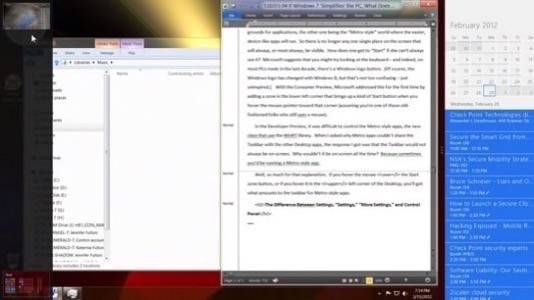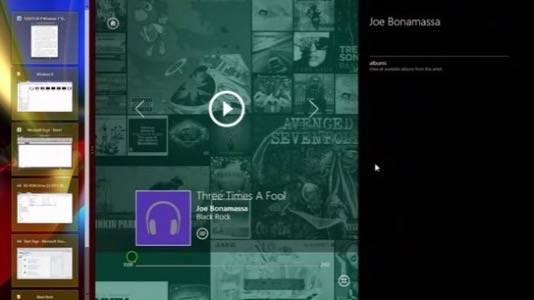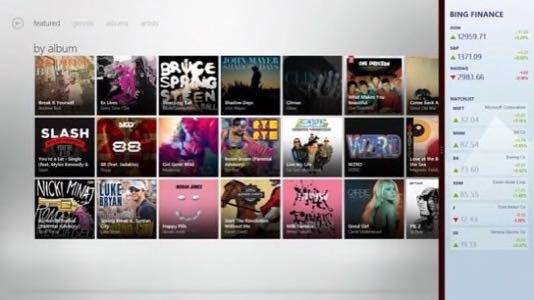Assume for a moment that you don’t own an iPad. Which device do you want more: a new, multitouch-endowed Windows 8 notebook computer, or a new iPad with the vastly improved resolution? Okay, so the latter is available now and the former is not. But if you have already acquired that iPad, or are just about to, will you want that Win8 Ultrabook come October?

These are serious questions for serious people, and it’s a good thing that ReadWriteWeb knows their numbers. We’ve convened the Panel of Esteemed Grown-ups (PEGs) to take up the issue of Windows 8’s success against Apple’s iOS-based steamroller. Joining us for the discussion (left to right):
Ross Rubin, Executive Director and Principal Analyst, NPD Connected Intelligence
Al Hilwa, Program Director for Applications Development Software, IDC
Sarah Rotman Epps, Senior Analyst for Consumer Product Strategy, Forrester
Carmi Levy, Correspondent, Yahoo Finance Canada; Contributing Technology Analyst, CTV
Timing is everything for the potential success of Microsoft Windows 8. If Microsoft is to succeed in making Windows 8 desirable, it needs to time its rollout message in-between the valleys of Apple’s peaks. The new iPad rollout this month was one peak. Rumors of a wider-screen iPhone are not what Microsoft wants to see coming into fruition in October.

Do You Want a Windows Tablet Now?
For Microsoft to pull this off, it needs to perform a delicate balancing act: It needs to make Windows 8 as desirable as anyone’s competing tablet. It needs to eat into that tablet’s screen time and take away a chunk of its attention. And at the same time, it needs to stand its ground as a technology distinct from tablets, and devoted to real-world productivity. This is what our analysts are telling us.
“The rules of the game in tech are, if someone gets in my business, I have to get into their business,” says IDC’s Al Hilwa. “Microsoft was correctly able to see that a smartphone or a tablet packs as much computing power as a PC, or if not yet, soon will. So within a couple of short years the installed base of all smartphones and tablets was probably going to approach that of PCs, giving their vendors the strategic opportunity to encroach on the PC. The writing was on the wall, as such devices are a keyboard and a monitor away from essentially being functionally fungible with a PC.”
But even with that bold handwriting, Hilwa believes, the market does not always evolve the way that companies’ marketing managers anticipate. “Often the users are not the ones who dictate how things go; the vendors have to lead.” He cites the fact that the market wasn’t really demanding a large, flat, touchable phone whose functions are manipulable with their fingers – not until Steve Jobs held one in his hand. So getting the technology out there and letting the market bake it the rest of the way, Hilwa believes, is the right approach for Microsoft.
“If consumers have any objection to Windows 8, it would likely be the duality and lack of continuity between its two main user interfaces, Metro and Desktop mode. That is its greatest strength and its greatest liability.”
Ross Rubin
Executive Director and Principal Analyst, NPD Connected Intelligence
“Now, they may not get it right in the way this hybridizes right away,” he says. “But I think there’s something there in simplifying the whole interface, and allowing a lot of people to touch the screen instead of the mouse when they’re typing… There are pros and cons, and there may be many different input devices. The touch screen may go out and compete with the mouse and the trackpad and the trackball like everyone else. Then let people decide which is easier for them, for their [respective] apps and profiles. I think it’s the right approach, providing more choice, letting these different input devices battle it out, and letting touch not be exclusive to one type of device.”
The data that Sarah Rotman Epps sees indicates that, while the market may be very capable of making decisions, those decisions can turn on a dime. Forrester compared the results of two similar surveys of prospective tablet buyers conducted in January 2011 and September 2011. At the beginning of last year, Windows commanded consumers’ preferences for a tablet operating system. By September, Apple had seized that position. But more consumers last fall would prefer a Windows-based tablet to an Android-based one.
“Every day that consumers are waiting for Windows 8, many sales are lost to Apple,” Epps tells us. “We do believe that there will be demand for Windows tablets, but with every day that they’re not on the market, Microsoft is losing share.”
This time around, rather than appearing overly ambitious, the usual rumors of Microsoft’s fall release seem to confirm that the company has read the handwriting on the wall. “At this point, they have no choice,” says Epps. “They have to continue with the course they have set for themselves, which is to perfect their product and then launch it. If they launch it too soon and it’s not fully baked, it risks the problem that consumers had with netbooks. When netbooks first came on the market, before there were Windows netbooks, there was a very high return rate for dissatisfaction. Microsoft has learned from that lesson – if consumers don’t like the gadget, they’re going to return it. That’s not good for anyone, so they want to get it right.”

The Future of Windows in Your Hands
“Metro is in many respects the future of Windows,” states NPD’s Ross Rubin. “Microsoft is betting that not only will the tablet form factor continue to grow, and that it wants to be well positioned for that growth, but that increasingly we will move to more direct manipulation in notebooks and desktops as well.” Rubin notes the brief resurgence of the desktop PC form factor, by way of providing a low-cost vehicle for touch-enabled screens – an alternative to the all-in-one form factor that usually commands a premium. Meanwhile, Intel has already begun defining the Ultrabook form factor for lightweight and power-conserving notebooks, the next phase of which is expected to incorporate touchscreens.
“At this point, they have no choice. They [Microsoft] have to continue with the course they have set for themselves, which is to perfect their product and then launch it.”
Sarah Rotman Epps
Senior Analyst for Consumer Product Strategy, Forrester
So Windows 8 has the opportunity to be perceived by the public as something physical, not just an ethereal concept of an operating system. Thanks to new form factors, consumers may be able to imagine holding Windows 8 in their hands, or at least touching it, the way they imagine holding an iPad in their hands. It may be this physical connection that Microsoft will rely upon to cement Win8’s place in the market. Meanwhile, Rubin points out that functionality aspects other than just ergonomics will matter very significantly. If consumers have any objection to Windows 8, he remarks, “it would likely be the duality and lack of continuity between its two main user interfaces, Metro and Desktop mode. That is its greatest strength and its greatest liability, because if you need to regularly switch between them, that creates a jarring experience.
“One of the differences between a Windows tablet and an iPad or an Android tablet is that, on iPad or Android, you’re getting a pure tablet experience. You’re never moving into any mode that has been optimized for keyboard and mouse,” NPD’s Rubin continues. “But Windows 8 will be backward-compatible, particularly on Intel, with a huge legacy of applications. So that’s what gives PC vendors the opportunity to market it as both a traditional PC and a tablet. And there’s an opportunity there for PC vendors to say, ‘Hey, we’re delivering the best of both worlds. They may sometimes collide with each other, but you may not need a secondary tablet device.’ And for most consumers today, the tablet cannot serve as that primary device that they can use for both casual consumption of entertainment and productivity.”
Ah, there’s the rub! Productivity may be the iPad’s Achilles heel, the part that renders it, in some consumers’ minds, handicapped. But Apple’s nearly flawless marketing thus far may be turning that issue on its head, making Windows’ reliance upon old-world productivity software for its value proposition into the ball-and-chain that weighs it down.
“Productivity isn’t sexy,” pronounces Carmi Levy, “and Microsoft isn’t going to garner consumers’ and business buyers’ attention by only focusing on productivity. It has to have sizzle in there as well in order for folks to pay attention. It has to have that emotional component. You don’t buy an Apple device because it’s a logical purchase; you buy it because it appeals to your emotions. Microsoft needs to play that game, or it will perpetually stay below the radar, and simply be a utility that no one pays attention to until they need to replace it.”

That Pesky Productivity
Levy believes it’s possible for Microsoft to market what I’ve called “the two worlds of Windows 8” as enabling a “device-appropriate user experience” for multiple classes – a concession to the fact that neither style of operating system is appropriate for all devices, by enabling two (or perhaps more) styles that could be adaptable in varying degrees across the whole chain. Still, he notes that while styles of presentation may be separable, the underlying functionality must contain some unwavering quantum of continuity.
“You can’t easily cleave the consumer experience from the productivity or business one. You need to continue to remain relevant to consumers who increasingly buy these things on their own on the weekend, and then march them into the office on Monday,” Levy argues. “It’s no longer the corporate buyer that’s making the decision in many cases; it’s the consumer who initiates the process, and then forces IT to go along for the ride. If Microsoft only focuses on the productivity equation without communicating directly to consumers on a somewhat emotional or ‘want’ basis instead of a ‘need’ basis, it simply won’t be part of the conversation.”
“You don’t buy an Apple device because it’s a logical purchase; you buy it because it appeals to your emotions. Microsoft needs to play that game, or it will… simply be a utility that no one pays attention to until they need to replace it.”
Carmi Levy
Correspondent, Yahoo Finance Canada; Contributing Technology Analyst, CTV
IDC’s Al Hilwa disagrees, at least in part. The corporate buyer, he argues, will indeed be focused on the productivity part of the equation – even if the iPad never establishes itself as the productivity leader, what will trigger that buyer to go with Win8 instead will be how well Microsoft distinguishes itself in the all-important-though-not-sexy functionality department. “Office would surely differentiate PC tablets from the iPad, all things being equal,” says Hilwa. “What might get enterprise buyers to upgrade may be more about how Microsoft’s management stack can help smooth upgrade processes and reduce TCO. In the long term, a massive applications evangelism drive from Microsoft can help bring the productivity of touch and gesture applications to the right places in the enterprise where they bring added value.”
As for the “two worlds,” Hilwa perceives true potential in Metro’s ability to incorporate more functionality from the Desktop world – maybe not all of it, but certainly enough to accommodate the functions used by non-specialists. “A lot of what we do on PCs every day are very short, basic tasks, in and out of an app – simple modifications,” he tells RWW. “They don’t require heavy, formal, desktop publishing-capable software. It may be that there will be versions of these powerful apps on PCs today, and there may be versions or multiple sub-pieces that run independently, on their own, doing various things – single, focused tasks. That is how I see things evolving in the next two to four years.”
“The key question, really, for Windows is, will all apps ultimately become Metro apps?” states Ross Rubin. “Microsoft is certainly stacking the deck in favor of Metro apps by, for example, distributing only Metro apps through its integrated Store in the next version of Windows. There are, of course, some advantages for a Windows developer to not exclusively support Metro. One is easier backward compatibility with Windows 7 and XP. And in terms of user interface convention, the Mac as well. But over time, there’s going to be a very large installed base of Metro-enabled PCs, and there’s going to be increasing pressure for developers to support Metro, or at least some parts of their applications.”

The Novelty Hasn’t Worn Off
But here is where Forrester’s Sarah Rotman Epps sees either Microsoft or Apple being able to leverage customer sentiment to its advantage, by turning lack of reliance upon backward compatibility to its advantage. Rather than perceiving the lack of keyboard as a handicap for a tablet’s functionality, Epps notes consumers are embracing the novelty anyway. “They see it as an opportunity to engage with content and services in a new way.
“The rules of the game in tech are, if someone gets in my business, I have to get into their business.”
Al Hilwa
Program Director for Applications Development Software, IDC
“What we’re seeing is that a lot of productivity software companies are developing for iPad,” she reports, citing Forrester data. “And they’re focusing their efforts on iPad because that’s where the people are.”
One example Epps sites is a software vendor named Veeva which produces a CRM solution called iRep for pharmaceutical companies, exclusively for iPad – and for the foreseeable future, for no other class of device. Another is Intuit’s latest TurboTax for iPad, which enjoyed record sales last year. Intuit’s customer research revealed that the #1 location where iPad users ran TurboTax was on the couch, with #2 being in bed. “That’s a pretty different mode than being in a pure work mode. Consumers are using the touchscreen to get closer and more intimate with software, with content.
“I think the mistake that Microsoft is dealing with, is billing Windows 8 as ‘No Compromises.’ The reality is, consumers don’t see the iPad as a compromise,” Epps continues. “They see it as an exciting new way to compute… If Microsoft had launched its product a year-and-a-half ago, they could have told a better story or made a better case for productivity. But right now, it’s hard to say you can’t be productive on an iPad. That’s a scary truth for Microsoft.”
Carmi Levy agrees with Epps in principle, but draws a different conclusion. “If this had been a couple of years sooner, maybe pre-iPad, Microsoft would have been able to focus its efforts a little bit more finely. But in 2012, with continued degradation of the PC as the central platform and the growth of the iPad as a validator of the tablet form factor, it’s clear that Microsoft has no choice but to go in this direction,” Levy remarks.
“The pieces for this consistent, multi-platform experience, whereby you have access to your content and your application that exists in the cloud through all of your devices, no matter how large or how small, is really where Microsoft may not just compete with Apple, but in many cases go beyond Apple,” he continues. “The difference with Microsoft is, it has the productivity market pretty much to itself. We don’t do work on Apple software; we enjoy ourselves using Apple devices, we run apps, we entertain ourselves using Apple devices, but when push comes to shove and we want to create content in a business/personal/educational context, it’s Microsoft all the way. Apple’s never really challenged. If Microsoft can transition that paradigm into a cloud-based reality that’s independent of any one device, and use Windows as the package for that – adaptable Windows across anything that you might own or have access to – that’s the slam-dunk this company needs, not just to survive but thrive.”










